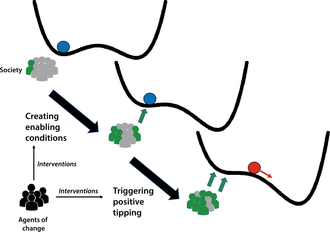Draft:Positive tipping points
 | Draft article not currently submitted for review.
This is a draft Articles for creation (AfC) submission. It is not currently pending review. While there are no deadlines, abandoned drafts may be deleted after six months. To edit the draft click on the "Edit" tab at the top of the window. To be accepted, a draft should:
It is strongly discouraged to write about yourself, your business or employer. If you do so, you must declare it. Where to get help
How to improve a draft
You can also browse Wikipedia:Featured articles and Wikipedia:Good articles to find examples of Wikipedia's best writing on topics similar to your proposed article. Improving your odds of a speedy review To improve your odds of a faster review, tag your draft with relevant WikiProject tags using the button below. This will let reviewers know a new draft has been submitted in their area of interest. For instance, if you wrote about a female astronomer, you would want to add the Biography, Astronomy, and Women scientists tags. Editor resources
Last edited by Femke (talk | contribs) 2 months ago. (Update) |

Positive tipping points (PTPs) or Positive Social Tipping Points (PTPs) is a beneficial change in a system which becomes non-linear, self-reinforcing and self-propelling after a critical threshold leading to abrupt and often irreversible changes.[1] [2]
PTPs represent a relatively new strategy for accelerating the shift towards a sustainable, post-carbon society. [2] They are termed 'positive' because they aim to mitigate the 'negative' impacts of global heating and Earth System Tipping Points (ESTPs) or the Negative Tipping Points (NTPs). The NTPs essentially refer to the actions that amplify negative impacts of climate change and lower societal resilience. The NTPs arise due to the failure in adaptation and mitigation to climate change. [2][failed verification]
A PTP is predominantly advantageous for humans and the environment whereas a negative earth system tipping point is the one that is predominantly harmful for the humans and the environment. [2] Conversely, the ‘beneficial tipping points’ or PTPs are actions that reduce the impacts of climate change and increase societal resilience. The PTPs are systems that are deliberately encouraged in the form of actions, interventions and societal changes to trigger positive change that tips to achieve a just and sustainable future. Thus, the concept goes beyond the prevention of adverse impacts of climate change. In the Earth system, tipping points emerge from self-amplifying or positive (reinforcing) feedback mechanisms. A minor change in one part of the system can amplify effects in other parts, driving the Earth system towards a significantly different future state. [3]
Actions that can trigger PTPs
[edit]Actions that can trigger these PTPs include social, ecological, policy and technological innovations, policy interventions, public-private investments and behavioral changes.[2] Positive Tipping Points (PTPs) can significantly enhance resilience against some of the world's most pressing challenges, including human-induced climate change, which has severely impacted the environment and threatened global food and water security.
The scale and pace of actions necessary to mitigate negative tipping point threats can be achieved, partly because similar tipping dynamics exist in societies, and can work in favor of mitigative actions. These positive tipping point opportunities can be exploited through coordinated strategic interventions that can lead to disproportionately large and rapid benefits and accelerate the transition of societies toward sustainability. This is already happening in some cases. For instance, targeted actions have created economies of scale that are now propelling the rapid uptake of renewable energy worldwide, which has reached or exceeded cost parity with fossil fuel power generation.[2] One positive tipping point can trigger the others, creating a domino effect [2] of positive change.
Examples
[edit]As an example, electric vehicles pass a positive tipping point towards becoming a dominant form of transport. This reduces the costs of battery technology. Lower-cost batteries in turn provide essential storage capacity to reinforce the positive tipping point to renewable power, which can trigger another tipping point in producing green ammonia for fertilizers, shipping, and other sectoral areas.[2]
References
[edit]- ^ Lenton, Timothy M.; Benson, Scarlett; Smith, Talia; Ewer, Theodora; Lanel, Victor; Petykowski, Elizabeth; Powell, Thomas W. R.; Abrams, Jesse F.; Blomsma, Fenna; Sharpe, Simon (January 2022). "Operationalising positive tipping points towards global sustainability". Global Sustainability. 5: e1. Bibcode:2022GlSus...5E...1L. doi:10.1017/sus.2021.30. ISSN 2059-4798.
- ^ a b c d e f g h Studio, University of Exeter Design. "Home". Global Tipping Points. Retrieved 2024-08-01.
- ^ Lenton, Timothy M.; Held, Hermann; Kriegler, Elmar; Hall, Jim W.; Lucht, Wolfgang; Rahmstorf, Stefan; Schellnhuber, Hans Joachim (2008-02-12). "Tipping elements in the Earth's climate system". Proceedings of the National Academy of Sciences. 105 (6): 1786–1793. doi:10.1073/pnas.0705414105. ISSN 0027-8424. PMC 2538841. PMID 18258748.